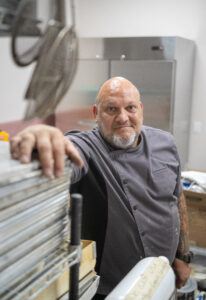The sun shines on Lycoming College’s 177th commencement

RALPH WILSON/Sun-Gazette Correspondent The Lycoming College Class of 2025 shower the Fultz Quad with confetti and the close of the 177th commencement ceremony at the school on Saturday, May 10, 2025.
To say that it could have been a more perfect day would be to understate the scene at Lycoming College’s 2025 Commencement. The sky was blue, the sun was shining after what seemed like a week of rain and everyone was ready to celebrate the graduates. Phones were up, ready to record the event; t-shirts with graduates’ faces displayed could be seen; and even a cow bell rang out occasionally signalling the festive mood of the crowd of parents and friends.
As the gates to the Fultz Quad were opened Saturday afternoon and the 215 graduating students-many of them the first in their families to attend college-entered to the familiar sound of Elgar’s “Pomp and Circumstance March,” it was time for the graduates to step into their future.
Speaking to the last class that will graduate under his leadership as president of the college, Dr. Kent C. Trachte, who is retiring next month, talked about the diversity of the graduates.
“Seated among you are residents from states from the east coast to the west coast and from the north to the south,” Trachte said.
He noted that there were students from countries such as Nigeria, Japan, the United Kingdom, Bulgaria and Egypt also graduating.
“In your diversity, you represent the future,” he said.
“Class of 2025, you are graduating at a time when higher education is under attack. The value of a liberal arts education is being questioned and uncertainty is pervasive and it would be normal to feel some anxiety about the future-the message today, however, is one of optimism and confidence,” he said.
Because of the education they had received at Lycoming, Trachte told the students, “You are prepared to live lives of meaning and enjoy success in your careers and contribute to the public good.”
He noted that because they began their college careers in 2021, during the COVID pandemic, the students had learned about “resilience and grit.”
“You enter post-college life equipped with knowledge and a capacity to reason that will serve you well. You have learned that leadership requires compassion. You have developed grit. You are resilient. You have learned to use your voices to promote change, ” he said.
“You have indeed thought deeply and acted boldly, so Class of 2025 as I enter my retirement, I am hopeful about the future because I know that you will make a positive difference in the world,” Trachte said.
The theme of diversity continued as the keynote speaker, Dr. Shirley M. Collado, president and chief executive officer of College Track, and also the first in her family of Dominican immigrants to graduate from college, spoke of her life’s journey.
“I’s no accident that I’m joining you today, and I want to begin my address by sharing a little bit about how I got here. I am a first generation college student from Brooklyn, New York, the eldest daughter of immigrants from the Dominican Republic. I never saw myself going away from home for a four year college. My father was a New York City cab driver, and then my mother worked in a factory making baby garments alongside her sister and mother,” Collado said.
Because she was “open to possibility,” Collado said that she took advantage of the opportunity offered her when she was selected to be a Posse Scholar, which she said at that time was a “college access experiment with no track record of student outcomes.” She chose to attend Vanderbilt University.
“I was chosen for this program, not because I was looking for it, but because I was open to it,” she said.
“So when someone saw potential in me and encouraged me to apply, I did, and the results of my college experience didn’t look anything like I was expecting or even dreaming for,” Collado said.
She shared how she stayed in the south to earn both her undergraduate and graduate degrees.
“And that was the beginning of the journey that led me here today,” she said.
Along the way, she met Trachte.
“President Trachte was a sounding board and a mentor. He encouraged me to build a career in higher education, to leverage join my perspectives and life experiences as an Afro-Latina from an immigrant household, even though President Trachte and I are very different people from very different backgrounds, he believed in what I could accomplish in a space that so desperately needed fresh ideas, voices and perspectives,” she said.
“You see, this is a theme. I stayed open to the unknown. I trusted in connections. I went with people who look and are very different from me. I took a chance at opportunities that were outside of my comfort zone to different places and with different people. Those experiences shaped me and allowed me to…contribute to the environments I was in. And the driving factor of that experience is the exact same as yours,” she continued.
Collado affirmed her belief in higher education.
“I believe in the importance of the experience you have had over the last several years on this campus, and I say I’m firm in the belief at a time in our history when the value of a bachelor’s degree is being called into question-when education in America is being dramatically reconfigured-earning a bachelor’s degree not only creates social and economic mobility, it prepares young people to navigate the complexity of our world. In this way, higher education doesn’t just fuel the fire of individual dreams. It fuels the American dream. There is no other time in your life where you will intentionally live and learn in a community filled with people you would not have normally selected as friends,” she said.
She noted that the time they spent in college has challenged them to “broaden their scope.”
“I hope that you will hold this close to your heart as you move into your lives and careers. And this is not just sentimental. It is critical to the future of our nation,” she said.
“We exist in a world currently that seems so divided, where our shared humanity feels so vulnerable. This moment requires awareness, empathy, connection and collaborative decision making. It also requires a willingness to listen too, to understand, to be inspired by people who do not think like you. This is exactly the mindset we need to have when solving the most complicated issues that impact all of us. And this is what places like Lycoming College have demonstrated for decades, for centuries. Here you have seen the magic that happens when people, ideas and disciplines that are not normally in conversation, start a conversation, and this magic is as powerful as it is necessary,” she said.





